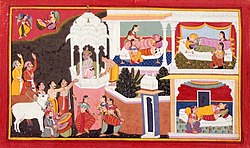Sumitra
This article needs additional citations for verification. (August 2015) |
| Sumitra | |
|---|---|
| Ramayana character | |
 Sumitra gives birth to twins (centre, top) | |
| In-universe information | |
| Spouse | Dasharatha |
| Children | Lakshmana (son) Shatrughna (son) |
Sumitra (Sanskrit: सुमित्रा, IAST: Sumitrā) is second queen consort of Dasharatha, the king of Kosala, who ruled from Ayodhya.[1] She is the mother of the twins Lakshmana and Shatrughna as mentioned in the Hindu epic, the Ramayana.
At the sacrifice conducted by Rishyasringa to obtain sons for the childless Dasharatha, a divine being emerged from the flames with a golden vessel filled with divine payasam. Dasharatha offered half to Kaushalya, a quarter (literally half of that which remained) to Sumitra, an eighth to Kaikayi (again, half of that which remained), and then, on reflection, presented the final eighth to Sumitra.[2] Having received two portions, Sumitra became the mother of twin sons.
Considered the wisest of Dasaratha's three wives, she supported Lakshmana's decision to accompany Rama,[3] to serve him during his exile, and comforted Kaushalya after the departure of her son.[4]
Personality[edit]
Neither the principal queen nor the favored wife, Sumitra was single-minded in her devotion to her husband and to the senior consort, Kaushalya. She was also known for encouraging her son Lakshmana to go into exile with Rama. While Valmiki is silent on her parentage, later texts variously described her as a princess of Kashi or of Magadha, and belonging to the Haiheya clan.
Etymology[edit]
Sumitra is broken into Su meaning good and Mitra meaning friend. Thus, her name means 'a good friend' or 'one with friendly nature'. She is known as, Tamil: சுமித்திரை (![]() listen), Burmese: Thumitra, Malay: Samutra, Khmer and Thai: สมุทรเทวี Samutthra Thewi).
listen), Burmese: Thumitra, Malay: Samutra, Khmer and Thai: สมุทรเทวี Samutthra Thewi).
References[edit]

